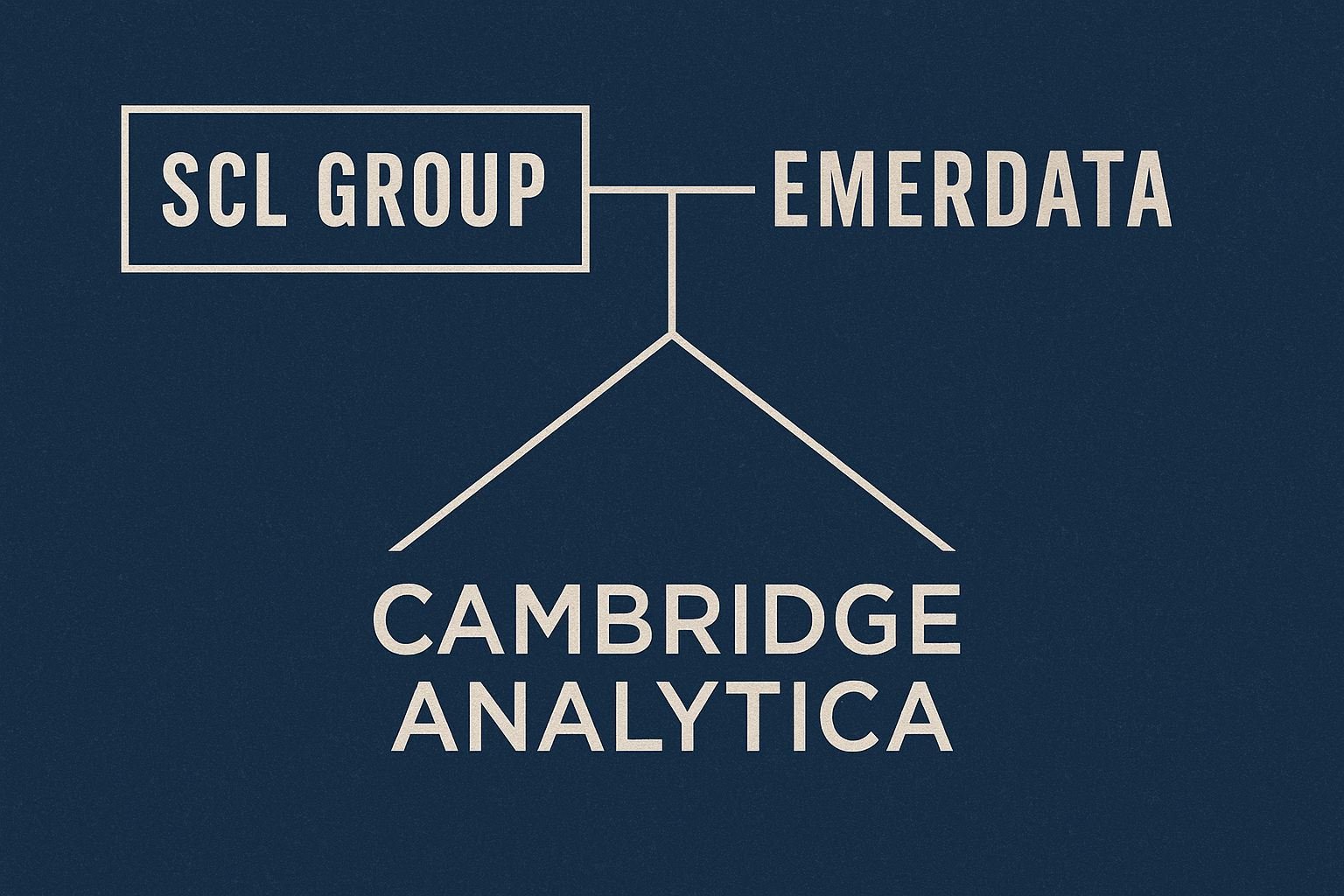The parent company: SCL Group
Before Cambridge Analytica became a household name, its parent company, SCL Group (Strategic Communication Laboratories), had already built a long history in psychological operations, defense contracting, and political consulting.
Founded in the 1990s in the United Kingdom, SCL specialized in behavioral change communications — the art of influencing attitudes through targeted messaging.
Its early clients included governments, military organizations, and NGOs seeking to understand and shape public opinion.
In military contexts, SCL described its methods as “psyops” — psychological operations used to influence populations during conflicts or peacekeeping missions.
From defense to democracy: shifting focus
During the 2000s, SCL expanded beyond military and humanitarian work into electoral politics.
The company offered “data-driven strategy” to political campaigns across the world, from Eastern Europe to the Caribbean and Africa.
It promised to use the same tools once reserved for information warfare to win elections.
This transition reflected a broader shift in global politics: the rise of information manipulation as a legitimate campaign technique.
As digital platforms grew, SCL realized that the battlefield of influence had moved online.
The birth of Cambridge Analytica
In 2013, SCL partnered with American investors to launch Cambridge Analytica, a U.S.-focused subsidiary.
The company’s goal was to leverage SCL’s psychological expertise within the booming world of social media advertising.
Key to this expansion was billionaire Robert Mercer, a computer scientist and hedge fund manager, and Steve Bannon, who would later become a senior advisor to U.S. President Donald Trump.
Mercer provided the funding; Bannon provided the political vision.
Cambridge Analytica marketed itself as a revolutionary data analytics firm that could “change behavior” using digital microtargeting.
In reality, it was SCL’s methods adapted to the age of Facebook.
How SCL and Cambridge Analytica worked together
While Cambridge Analytica handled high-profile political campaigns, SCL continued operating as the umbrella company providing the technical infrastructure and personnel.
Many employees and data scientists moved fluidly between the two entities.
Publicly, the firms appeared separate; privately, they shared resources, offices, and even client data.
Cambridge Analytica became the U.S. brand of SCL’s political division.
Their combined operations offered governments and candidates the ability to run large-scale behavioral influence campaigns, supported by psychographic profiling and social media targeting.
Enter Emerdata: the mysterious successor
After the Cambridge Analytica scandal erupted in 2018, both companies faced intense public backlash and legal scrutiny.
Officially, Cambridge Analytica and SCL went into administration (the U.K. equivalent of bankruptcy).
But behind the scenes, a new entity quietly appeared: Emerdata Limited.
Founded in 2017, Emerdata listed several of the same directors and shareholders as SCL and Cambridge Analytica — including Rebekah Mercer and Jennifer Mercer, daughters of Robert Mercer.
Former SCL executives also joined its board.
Its stated purpose: “data processing, hosting, and related activities.”
To many observers, Emerdata looked like an attempt to restructure the same business under a new name.
Corporate continuity or reinvention?
Investigative journalists quickly noticed that Emerdata’s incorporation coincided with the peak of scrutiny against Cambridge Analytica.
This timing fueled speculation that the company was a vehicle to absorb assets or intellectual property before regulators intervened.
While definitive proof of continuity remains elusive, the overlap in leadership, investors, and company addresses paints a compelling picture.
As one analyst put it, “Emerdata is less a reincarnation than a reorganization of the same power network.”
The global network of influence
SCL Group and its affiliates built a far-reaching network of subsidiaries and partners operating across continents.
Some specialized in defense analytics, others in political consultancy, and others in corporate communication.
This network allowed them to rebrand and reappear under different names, making oversight difficult.
The company’s marketing materials boasted experience in more than 60 countries.
Whether advising governments, managing propaganda campaigns, or running election data centers, SCL positioned itself as a global authority in “strategic communication.”
What Emerdata represents today
As of the mid-2020s, Emerdata Limited remains an inactive or dormant company on paper, but its existence continues to symbolize how data-driven influence adapts rather than disappears.
The people and methods pioneered by SCL and Cambridge Analytica have dispersed into other firms specializing in data analytics, AI-driven marketing, and political consulting.
Many of these modern agencies avoid the controversial branding but still rely on similar methodologies — analyzing online behavior to craft persuasive narratives at scale.
The lasting legacy of the SCL ecosystem
The SCL–Cambridge Analytica–Emerdata triangle illustrates a fundamental truth about the digital age: data influence never truly dies; it merely evolves.
The scandal may have dismantled one company, but it also sparked a global industry of political data analytics.
What was once seen as experimental “psychological warfare” is now part of everyday campaign strategy.
This evolution challenges lawmakers and citizens alike to rethink what transparency and accountability mean in the 21st century.
How can societies ensure that influence operations — whether for profit, politics, or propaganda — are subject to democratic oversight?
Looking forward: lessons from a hidden empire
The SCL story reminds us that behind every digital scandal lies a network of people and institutions.
Companies can be dissolved, but knowledge, data, and technology live on.
As governments explore new regulations on AI and data ethics, the legacy of SCL offers a critical case study in how power adapts to survive.
The collapse of Cambridge Analytica was not the end of data-driven influence — it was the beginning of a new chapter.
Understanding that history is essential for anyone seeking to defend democracy in a world where algorithms increasingly decide what we see, believe, and vote for.
Takeaway: Behind Cambridge Analytica stood a powerful network — SCL Group, its creators, and Emerdata, its successor.
Together, they reshaped the relationship between data, politics, and persuasion. The companies may be gone, but the methods they pioneered continue to shape the future of information and influence.
- The parent company: SCL Group
- From defense to democracy: shifting focus
- The birth of Cambridge Analytica
- How SCL and Cambridge Analytica worked together
- Enter Emerdata: the mysterious successor
- Corporate continuity or reinvention?
- The global network of influence
- What Emerdata represents today
- The lasting legacy of the SCL ecosystem
- Looking forward: lessons from a hidden empire







